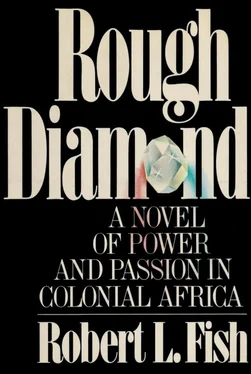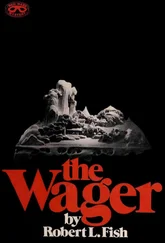“What do you mean the dirt is running out? Dirt keeps going down and down, right to the middle of the world, doesn’t it? How can it run out? What’s under dirt?”
“The yellow dirt,” Solly explained. “What’s under it is some blue stuff that’s hard as rock. They’ve run into it in other places and abandoned the claims, or put back some of the yellow and tried to sell them for practically nothing. Salting a mine with dirt, can you imagine? Anyway, you can break the point of a pick on that blue stuff, and how we’d break it up if we ever managed to dig it and send it up to the sorting yards, God knows! Kimberley Central, the claims next to our Kerr Number Three, are all down to the blue right now. And it’s just too tough to dig and break up.”
“Have you tried?”
“Well, no, not very hard,” Solly admitted, “but Kimberley Central did without any luck. They say it’s a waste of time.”
“Who says?” Barney demanded, and then answered his own question. “I know — your friends at the Kimberley Club. Well, if they’re as wrong on this as they are on everything else, like illicit stones and how to handle their Kaffirs, then the chances are the blue ground has even more diamonds than that yellow dirt.”
Solly shook his head at his uncle’s stubbornness. “I doubt it.”
Barney shrugged good-naturedly. “So that’ll be my second mistake in one day. And we don’t close down Kerr Number Three. We don’t let a single man go. We add men. And we dig.”
“But, how?” Solly was almost wailing. “How do you dig it? How do you break it down? Water doesn’t touch it; it’s been tried.”
“You mine it and you break it down with different equipment if you can’t do it with pick and shovel,” Barney said simply. “Bigger equipment, power equipment. I’ll get you the equipment.”
“It’ll cost a fortune! Money wasted! It’ll break the company!”
“So that’ll be mistake number three.” Barney grinned across the table. Despite their many differences, differences in attitude on almost every subject, differences in education, in appearance — for Solly Loeb was a well-built, handsome young man — Barney liked the boy. At least he had far more spirit than the other nephew, Jack Joel, and besides, he was the son of Barney’s eldest and favorite sister. “Good things are supposed to come in threes, no? So why not mistakes?”
“Disasters are supposed to come in threes,” Solly said sourly.
“So this time it’s simply mistakes. They won’t be disasters until I’m proved wrong. Don’t take it so hard, Solly. You’re doing a good job at the mine. I appreciate it.” Barney finished his beer and came to his feet, wiping his mouth. “I’ll get you the proper equipment as soon as possible.”
“But what kind of equipment?”
Barney smiled. “I haven’t the faintest idea,” he said, “but when I first came here I didn’t know what a pick was, or a whim, or anything else. And all I knew about diamonds you could put in your eye and it wouldn’t make you blink. The right equipment? Get me some samples of that blue ground if you have to dynamite it, and I’ll have somebody on the next coach to Cape Town with it to find out what it takes in machinery to dig it and crush it.” He looked at the clock. “I’ve got to run. I’m meeting Carl Luckner at the boxing academy for a lesson in that tricky Jap stuff. You know what? It’s cute and all that, but I like using these better.”
He raised his two fists in the air, shook them, smiled, and walked out, leaving his nephew shaking his head in frustration. The yellow dirt was running out, and with it the diamonds would be running out, and all his uncle could think of was taking a lesson in some Japanese silliness!
But Japanese silliness was very far from all his uncle was thinking of. As Barney walked quickly down the dirt road toward the boxing academy where he was to meet Luckner, his mind was on the blue ground that apparently was at the base of the yellow dirt, and if it was found on the Kerr claims and on Kimberley Central’s as well, then the chances were it would eventually be found on the French Company’s claims and Robinson’s. There was a man named Atherstone that Barney had once talked to, a man from Grahamstown, who had said that the diamonds came from extinct volcanoes, that the yellow soil was the top of a pipe. If this was true, then the chances were that there were even more stones in the blue ground than in the yellow, and the farther down they went the richer the yield.
If that were the case, he could pick up some of what had been Kimberley Central’s finest claims for a song, claims that only weeks before had been estimated to be worth thousands of pounds. Added to the other claims he already controlled, it would make the Barnato Mining Company as large as De Beers, and probably a lot more productive. He was sure that proper equipment to dig and crush the hard blue ground had to exist, and he intended to buy it no matter what it cost. If he were wrong, of course, the expenditure of buying other claims, no matter how cheap, added to the cost of useless machinery and to the fact that with the yellow soil running out the diamonds would also be running out, and Barnato Brothers would be stony. It was quite a gamble.
It was also a sobering thought…
Gustave Bees was having a hard time of it. Without his daughter Fay to handle the chores and to do the cutting and the basting and the delivery and the collecting of payments and the buying of the cloth and all the many things Fay had done for him since his wife’s death, Bees was in trouble. The Kaffir woman Fay had arranged to do some of the work had been bush-trained and knew nothing about the cutting of cloth, or basting; a simple breechclout for her man working in the mines on contract was the extent of her previous experience with garments. Besides, she was ugly as sin, hugely pregnant, the food she cooked was sickening, and she smelled. In appreciation for the many things Fay had done for him — and also partially out of some touch of fear of the strong woman his daughter had become — Gustave Bees had tried to overlook the fact that, having married an infidel, his daughter was living in sin and would go to hell unless he brought her home and had the minister say the proper prayers over her. But when, added to the discomfort of his life put upon him by Fay’s absence, he also began to hear from his dead wife in his constant conversations with her in his mind, and when Emily Bees told him she wanted Fay eventually to be with her in heaven, which was impossible as long as she lived with the infidel, Bees knew he had to act.
Accordingly, one day he put his shears into their holster at his belt from habit, and set out to walk the several miles from his tent in Bultfontein to the Paris Hotel. The bar was fairly crowded when he walked in and climbed the steps, paying no attention to the men standing there drinking. Bees remembered the room on the second floor where his daughter lived with her lover; Fay had brought him back the day after her wedding to show him the hotel and the room. It had been when she told him she was married and would not be coming home but would arrange a Kaffir woman to do the chores and help him. She had not told him she was taking instructions to become a Jew; she had felt she had to give her father time to recover from the first shock before encumbering him with the second.
Bees rapped on the door and waited. Fay opened the door and then smiled a bit dubiously when she saw it was her father. There was nothing in his expression to indicate that the visit was a fatherly one, or even a friendly one. Fay opened the door a bit wider, inviting entrance.
“Hello, Pa,” she said and stepped back. “Come in.”
“There’s no need to come in,” Bees said. “I’ve come to take you home. Get your things.”
Читать дальше










